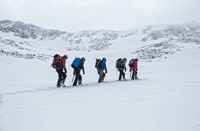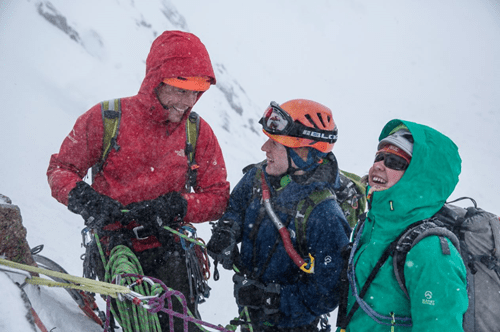Walkers and climbers urged to be prepared
Outdoor enthusiasts are being urged to make sure they’re well prepared before heading to the hills this winter.
Mountain safety experts have stressed that simple precautions, basic knowledge and appropriate equipment can greatly reduce the risk of accident and injury.
The vast majority of people will enjoy incident-free trips into Scotland’s wild places this winter. But every year there are people who get into trouble and have to be rescued by mountain rescue teams.
 Regrettably, on occasion, deaths and serious injuries can occur. In 2014, the last recorded calendar year, volunteers were called out 552 times to assist a total of 608 people. A total of 12 people died in mountaineering related incidents.
Regrettably, on occasion, deaths and serious injuries can occur. In 2014, the last recorded calendar year, volunteers were called out 552 times to assist a total of 608 people. A total of 12 people died in mountaineering related incidents.
This year a total of £1.81 million will help to go to support mountain rescue teams, the sportscotland Avalanche Information Service, the Mountaineering Council of Scotland and Scotland’s national outdoor training centre Glenmore Lodge, run by sportscotland.
Scotland’s winter weather can be challenging and extremely changeable, particularly on higher ground.
Some top tips for winter safety include:
• Check the weather forecast and avalanche information service, and change your plans if necessary
• Carry a compass and map and know how to use it. Don’t rely on GPS or smartphone
• Have an alternative plan in case weather conditions worsen
• Attend a winter mountaineering course to brush up on your skills
• Have all the appropriate equipment, including ice axe and crampons if conditions demand it
• Leave a note with details of your route and when you expect to return
• Read up about the risk of avalanche and how to spot the warning signs
Practical advice about planning your journey to the hills this winter, and other practical winter safety tips, can be found at ReadyScotland.org.
Jamie Hepburn, Minister for Sport, Health Improvement and Mental Health, said:
“Scotland’s wild places can be at their most beautiful during the winter months, and we want people to be able to enjoy them right through the year. There’s no doubt that the weather conditions make this more challenging, and while this challenge is part of the appeal for many, it must be treated with the utmost respect.
“Simple precautions and basic common sense can greatly reduce the risk of getting into trouble. Make sure you have the right equipment, and know how to use it. Weather conditions can change extremely quickly on the high peaks, with clement weather turning to blizzard conditions in a matter of minutes. Use your better judgement and never hesitate to change your plans if conditions worsen.”
Mark Diggins, Co-ordinator at the sportscotland Avalanche Information Service, said:
“Winter is most certainly upon us now, and we are faced with the normal challenges that a winter in Scotland’s mountains present. The beauty of the highland wilderness and the exploration of the hills, mountains, and glens provides a great attraction for walkers, climbers, skiers, ski tourers, and free-riders. Many thousands of enthusiasts enjoy the Scottish mountains every winter.
“However, the fast changing weather, with its snowfall, avalanche hazard, strong winds, and poor visibility requires us to be much more prepared when going into the mountains in the winter. Good clothing, navigational ability, appropriate equipment, movement skills on steep terrain, and use of ice axe and crampons are a necessary requirement for our enjoyment and safety.
“Also, getting good information helps any mountain goer decide where to go and what to do. Avalanche reports and other useful information which help with this important process can be obtained from the sportscotland Avalanche Information Service at www.sais.gov.uk, Met Office, and MWIS websites.”
Shaun Roberts, Principal of Glenmore Lodge, sportscotland National Outdoor Training Centre, said:
“Scotland’s winter mountains are a world-class arena for activity and sport, and the price of entry is preparation. To support your preparation, sportscotland invest in a world-class National Centre at Glenmore Lodge which has supported and led developments in winter sports since 1948. Additionally, we fully fund world-class services to provide quality information, such as the sportscotland Avalanche Information Service and Mountain Weather Information Service.
“If you are uncertain in your preparation then please seek advice and/or training from one of the many qualified instructors or guides operating in the mountains this winter. If you are an experienced mountaineer or back country skier, please make sure you take some time to gather the most up-to-date information and pack the kit you need. Always take the pressure off your decision making by having an alternative plan for the day and be willing to leave the summit ascent or gully descent for another time.
“I know exactly where I am going to be this winter – on a mountain, having an adventure. The question is, where will you be?”
Background
In 2015-16 the Scottish Government is providing the following funding to help ensure the safety of mountain users:
£312,000 annual grant funding for Scotland’s voluntary mountain rescue teams.
£1,505,300 (including Lottery funding) through sportscotland consisting of:
– £1,041,000 in Glenmore Lodge,
– £179,000 in the sportscotland Avalanche Information Service (SAIS)
– £285,300 in the Mountaineering Council of Scotland (including £42,300 for the Mountain Weather Information Service)






